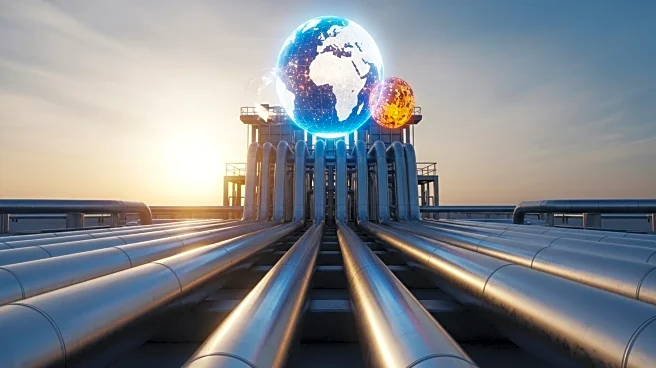What's Happening?
Iraq's Prime Minister Mohammed Shia Al-Sudani announced plans to cease the country's $4 billion reliance on Iranian gas by 2028. This move is part of a broader strategy to diversify Iraq's energy sources and address chronic power shortages. Iraq, a major
oil producer, has been dependent on Iranian gas for nearly a third of its electricity generation. However, frequent outages have led to reliance on private generators. Al-Sudani revealed that Iraq has signed agreements with TotalEnergies and other international firms to capture and process gas that is currently flared, which could significantly improve electricity supply. The initiative aims to eliminate gas flaring by early 2028, marking a significant shift in Iraq's energy policy.
Why It's Important?
The decision to end Iranian gas imports is crucial for Iraq's energy independence and economic diversification. By capturing flared gas, Iraq can reduce its environmental impact and improve electricity reliability, benefiting its citizens and industries. This move also reflects Iraq's strategic balancing act between maintaining ties with the U.S., Iran, and other global powers while attracting foreign investment. The shift could alter regional dynamics, especially as Iraq navigates renewed sanctions on Iran. The initiative may also bolster Iraq's political stability by addressing public grievances over power shortages and corruption.
What's Next?
Iraq's plan to diversify its energy sources will likely involve increased collaboration with international energy firms and Gulf partners. The upcoming parliamentary elections on November 11 could influence the pace and success of these initiatives, as political stability is crucial for attracting investment. The government is also focusing on reducing youth unemployment and fostering industries tied to digital transformation, which could further stabilize the economy and improve public trust.
Beyond the Headlines
Iraq's energy diversification efforts could have long-term implications for regional geopolitics, potentially reducing Iran's influence in Iraq. The initiative also highlights the global shift towards sustainable energy practices, as Iraq seeks to reduce gas flaring and improve environmental standards. The focus on digital transformation and cybersecurity indicates a broader economic modernization strategy that could position Iraq as a regional leader in technology and innovation.















